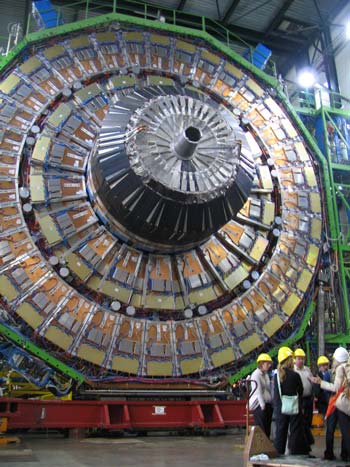ISTC Contributes to One of the Largest Science Projects in History

Scientists working at the European Organization for Nuclear Research (CERN) in Geneva are going through exciting times as they completed their first test run of the Large Hadron Collider (LHC) on 10 September. Experiments at the world’s largest and most powerful particle accelerator will attempt to discover how matter appears, which comes down to understanding the very foundation of the universe, the Big Bang. ISTC has contributed to this titanic 6 billion USD scientific adventure with 43 research projects worth 28 million USD.
The LHC consists of four detectors; two general purpose detectors, ATLAS and CMS, and two focused on particular tasks, ALICE and LHCb, which will explore processes involved in the head-on collisions of protons of extraordinarily high energy. The collider is contained in a circular tunnel with a circumference of 27 kilometres (17 mi) at a depth ranging from 50 to 175 metresbelow the earth’s surface.The 3.8 metre diameter, concrete-lined tunnel crosses the border between Switzerland and France at four points.
Russian scientists, engineers and technicians have played important roles in the construction of the LHC. Several ISTC-sponsored start-up projects, with enterprises such as “Lutch”, “Mashinostroitel”, and the Bogoroditsk Technical Chemical Plant (BTCP), led to the signatures of further projects and tenders for commercial orders, as well as expanded common work with CERN and other scientific centers. BTCP, for example, after an initial ISTC project worth 1,900,000 USD, subsequently obtained 36 million USD in direct commercial contracts.
Initiatives funded by ISTC have led to the development of new networks of collaboration between Russian scientists and their colleagues in other countries. During these years of collaboration, more than 600 former Russian weapon engineers and technicians worked on the CERN projectandCERN found an additional valued partner for the biggest project in high-energy physics. Thanks to thousands of scientists from all over the world collaborating together, the beginning of the world as we know it will start revealing its mysteries. The official inauguration of the new particle accelerator LHC was celebrated on 21 October 2008. Testing is scheduled to resume in spring 2009 after the usual winter maintenance period.

